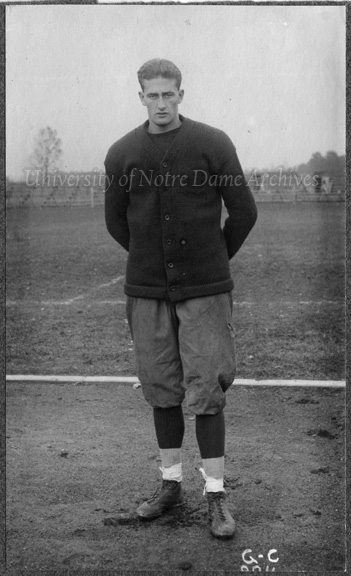
Only four Notre Dame student athletes have earned monograms in four different sports – Alfred Bergman (Class of 1914), Rupert Mills (1915), Johnny Lujack (1948), and George Ratterman (1949). Mills earned monograms in baseball, basketball, track, and football. Along with his athletic ability, Mills was president of the Senior Law Class and appeared in several theatrical productions at Notre Dame, along with his roommate Ray Eichenlaub.

After graduating in 1915, Mills signed an iron-clad contract to play professional baseball for the Newark Feds in the Federal Baseball League. When the team disbanded after the 1915 season, Mills was intent on getting his piece of the $3000 contract. Pat Powers, President of the ball club, was also under pressure from other players who had contracts. He tried to buy Mills’ contract in April of 1916 at $500 and to place Mills on a minor league team. Mills refused the compromise “and then Powers is reported to have said that if Mills wouldn’t be ‘reasonable’ and insist upon the fulfillment of his contract, Mills would have to report each day at the deserted Federal league park… each day at 10am, remain until noon, get back at 2pm and linger until 6pm. That’s what Mills will have to do seven days a week, over a stretch of twenty-two weeks, rain or shine. And Powers figures that the loneliness of the job will soon make Mills ‘open to reason'” [Scholastic, April 29, 1916, page 488, quoting an unnamed Newark newspaper].
[photoshelter-img i_id=”I0000ZU_irgYqEWs” buy=”1″ caption=”Men’s Basketball Team, 1913. Rupert Mills is seated at the far left” width=”576″ height=”401″]
Mills called Powers’ bluff, showing up at the field every day to play “solitaire baseball”:
“I’ve played 12 games since the season started,” said Rupe, “and won ’em all. What’s more, working alone has whipped me into great trim. It’s kinda hard to slam ’em out, beat the ball down to first and then have to call myself out. The first thing I know I’ll be chasing myself to the club-house and Pat Powers is liable to fine me $1o. When I get through in this league I ought to be a valuable utility player.
“If I don’t lead the league in everything but errors it won’t be my fault. So far I have knocked the cover off the ball every time. Everything is a hit because Rupe Mills is official scorer. I simply can’t fail to hit safely, because I do my own pitching.
“The other day I wrenched my ankle while sliding and I had to put myself in to run for me. I have a dickens of a time trying to pull a double steal. Everything else is a set-up.
“I do mostly pitching in the morning to get wise to my curves for the afternoon game. So far this year I haven’t been in any extra inning games.”
[Scholastic, May 20, 1916, page 533, quoting the Toledo News Bee].

Later that summer, after many a game of solitaire baseball, Mills and Powers eventually settled their differences. Mills went on to play for a farm club associated with the Detroit Lions and for the Denver Bears. His baseball career sputtered out and he enlisted in the Army during World War I. After being discharged, Mills decided to concentrate on a career in law.

Professionally, Mills held political positions including State Senator of New Jersey and Under Sheriff of Essex County. However, he did remain athletically active in local baseball and polo clubs. Mills was also a representative of Notre Dame in the East, sending reports of potential athletic recruits to his old teammate, Athletic Director Knute Rockne.
On July 20, 1929, Mills was visiting with political friends at Lake Hopatcong when he convinced a reluctant Louis Freeman to explore the lake in a canoe. Freeman was not a good swimmer, which turned fatal for Mills. The boat capsized 100 feet out and Freeman panicked, although he was wearing a life vest. Mills rescued Freeman, towing him back to shore with the help of an oar. About twenty feet from shore, Mills apparently suffered a heart attack and sank below the water.
Rupe was only 35 years old and his death was a shock to the Notre Dame and New Jersey communities. Notre Dame Alumnus reported that “twenty thousand persons lined the blocks around St. Augustine’s Church. The funeral procession was one of the largest and most impressive ever seen in the county” [September 1929, page 22]. The New York Herald Tribune reported, “Troop A of the 102nd Cavalry, of which Mr. Mills had been captain since the World War, led the procession from the home to the church. … Behind the regiment came the mourners and behind them marched World War veterans in uniforms, members of the Veterans of Foreign Wars, the American Legion and the Essex Troop. A police platoon under the command of Police Commissioner McGregor and a contingent of 200 firemen completed the procession” [July 25, 1929, page 2].
Sources:
Scholastic
Alumnus
PATH: Rupert Mills
UATH 16/78-79
Baseball Anecdotes by Daniel Okrent
GMIL 1/11
GTJS 7/28
GNDS 28/24
GKLI 1/12
